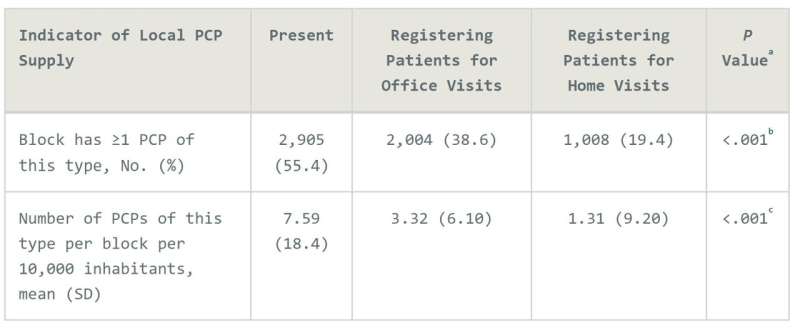This article has been reviewed according to Science X's editorial process and policies. Editors have highlighted the following attributes while ensuring the content's credibility:
fact-checked
peer-reviewed publication
trusted source
proofread
Survey suggests geographic inequalities in patient registration can exclude patients from comprehensive care access

French researchers conducted a large, simulated study to examine the relationship between the presence of primary care physicians (PCPs) and the ability of patients to register with a PCP. The study aimed to analyze local PCP supply based on various indicators, including PCP presence, patient registration availability for office visits, and patient registration availability for home visits.
Out of 5,188 census blocks, 55.4% had at least one PCP, with 38.6% of those blocks allowing registration for office visits and 19.46% allowing registration for home visits. The research revealed that geographic inequalities in patient registration were more significant than those related to PCP density, challenging the assumption that patients could easily find and register with a PCP.
They found that doctors were less likely to accept new patients who required time-consuming procedures including home visits and complicated services. Additionally, they were also less likely to accept new patients if they worked in areas that required them to take on the highest work loads (lowest PCP density in the most disadvantaged areas).
The authors argue that policy decisions mandating patient registration with a PCP to access health care may unintentionally exclude individuals who are unable to register with a PCP, preventing them from benefiting completely from the health care system.
Finding a PCP with whom to register in France is a prerequisite for benefiting fully from the health care system, access to which can be undermined by substantial PCP refusal to register new patients. PCPs can also refuse appointments to unregistered patients.
The findings from the study suggest that the number of primary care doctors in a specific area does not correlate with a patient's ability to register for care from any of those doctors. Patients who requested more complex services or were located in more disadvantaged areas were more likely to be denied registration for a PCP.
The researchers contend that the inability of patients to register with a PCP may result in the exclusion of certain patient groups from accessing health care services that require PCP registration. These observations highlight the need for a more nuanced approach in developing policies to ensure equitable health care access for all individuals.
The work is published in The Annals of Family Medicine journal.
More information: Raphaëlle Delpech et al, Presence of Primary Care Physicians and Patients' Ability to Register: A Simulated-Patient Survey in the Paris Region, The Annals of Family Medicine (2023). DOI: 10.1370/afm.3001


















